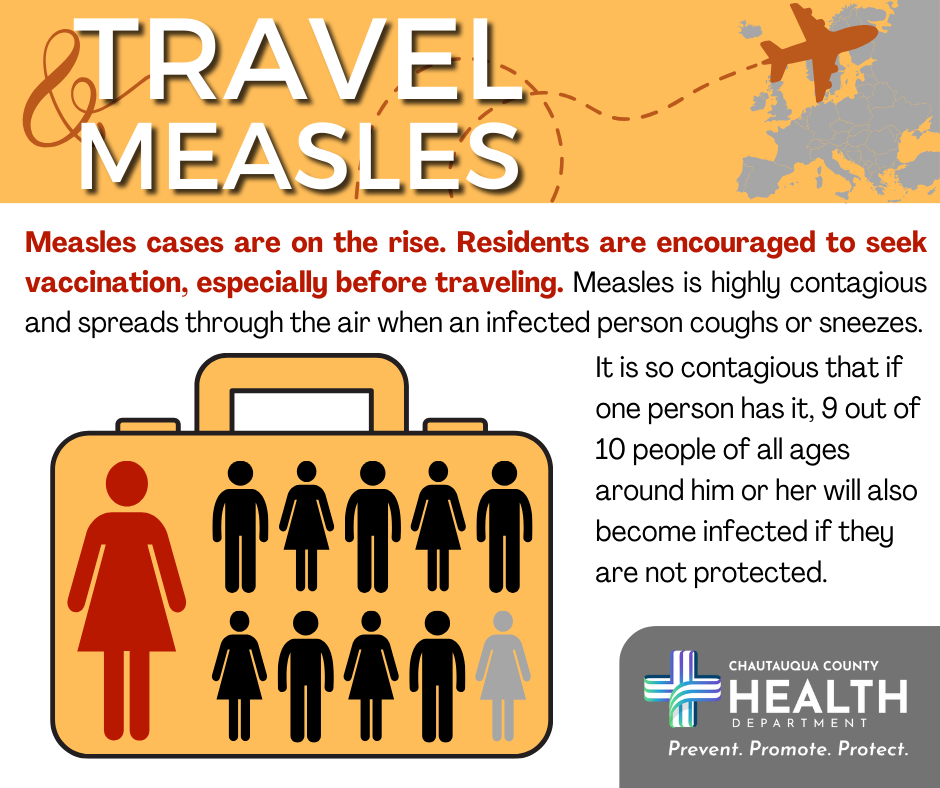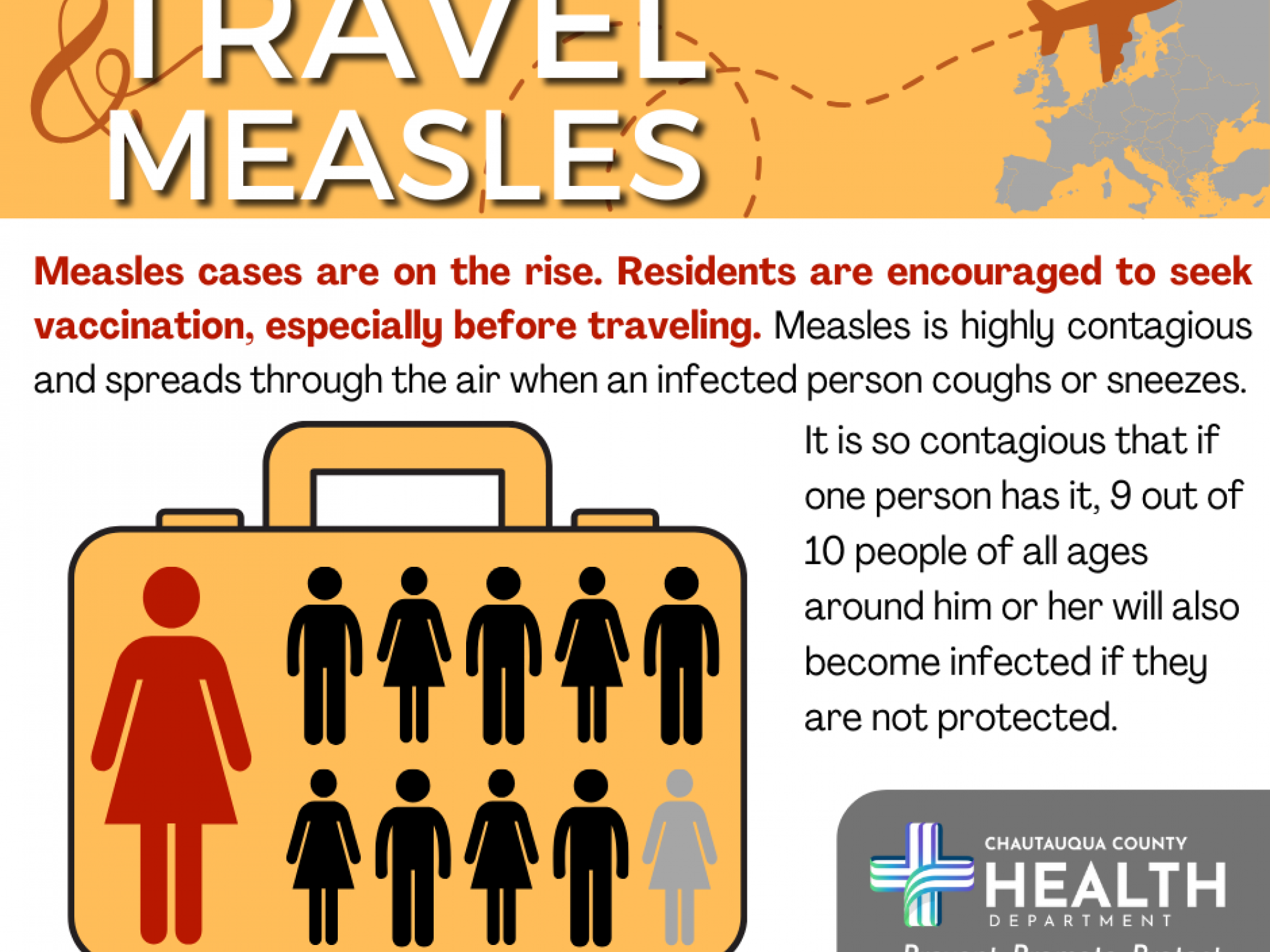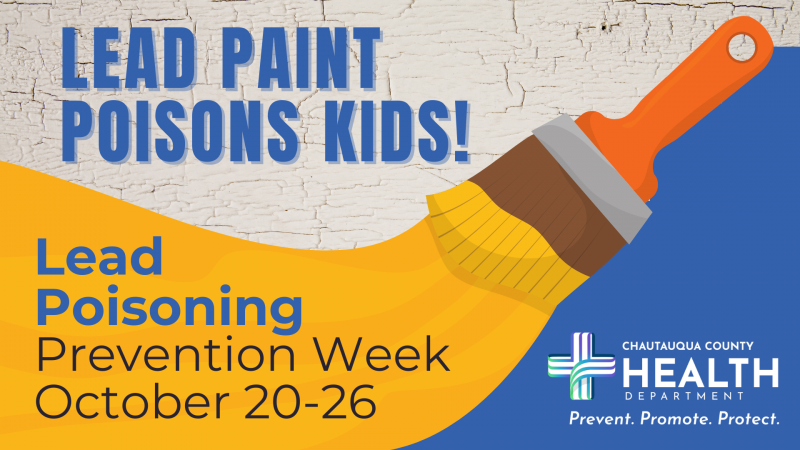
MAYVILLE, N.Y. - The Chautauqua County Health Department strives to prevent disease, promote wellness, and protect the health of the community. As part of those efforts, they want residents to know the facts about measles and the developing influx of positive measles cases in the United States. Areas around the world, including several states in the U.S. are experiencing an increase in measles cases.
How do measles outbreaks start in the United States?
In the United States, measles cases tend to originate from international travel. The disease is typically brought into the United States by unvaccinated people who get infected in other countries. Typically 2 out of 3 of these unvaccinated travelers are Americans. They can spread measles to other people who are not protected against measles, which sometimes leads to outbreaks.
The CDC reports over 61 million doses of measles-containing vaccine were postponed or missed from 2020 to 2022 due to COVID-19 related delays in supplementary immunization activities. This increases the risk of bigger outbreaks around the world, including the United States. The WHO reports over 30,000 measles cases by 40 of the Region’s 53 Member (non-US) States between January and October 2023, compared to 941 cases reported in all of 2022.
As of February 22, 2024, the CDC reports a total of 35 measles cases that were reported by 15 jurisdictions: Arizona, California, Florida, Georgia, Indiana, Louisiana, Maryland, Minnesota, Missouri, New Jersey, New York City, Ohio, Pennsylvania, Virginia, and Washington.
“We know travel among County residents increased during the recent school winter break and will again for the upcoming Easter break in April,” states Lacey Wilson, Public Health Director. “Last week, measles cases were reported in Florida, a popular travel destination for area residents this time of year. If you and your family have completed the MMR vaccination series, no matter how long ago, you are protected. If you have plans to travel for Easter Break and haven’t completed the MMR series, there is still time for you and your loved ones to receive a vaccination to protect against the virus. It only takes a few days for antibodies to develop to fight infection and within two to three weeks, the immune system is fully primed after vaccination.”
What to do if you plan to travel
People are at risk of measles infection if they have not been fully vaccinated or have not had measles in the past and travel to areas where measles is spreading. Individuals are encouraged to protect themselves, their families, and community by getting the measles vaccine, especially before traveling to an at risk area.
Unvaccinated individuals should contact their primary care provider to determine if a measles vaccine is right for them and to get the vaccination. The Chautauqua County Health Department offers the vaccine as well and residents can call 716-753-4491 to schedule an appointment.
“The measles vaccine has been around since the 1960s and has proven to be a safe and effective way to prevent new outbreaks,” states Michael Faulk M.D., Chautauqua County’s Chief Medical Officer. “It is given as a combination shot that also includes protection against mumps and rubella. One dose is 93% effective against measles, and two doses are 97% effective.”
After travel to an at risk area
Monitor for symptoms for 3 weeks upon return from high-risk areas. Measles is highly contagious and can spread to others through coughing and sneezing.
- If one person has measles, 9 out of 10 people around that person will also become infected if they are not protected.
- People who are infected can spread measles to others from 4 days before a rash develops through 4 days after the rash appears.
- Measles symptoms typically include:
- High fever (may spike to more than 104° F)
- Cough
- Runny nose
- Red, watery eyes (conjunctivitis or pink eye)
- Rash (3-5 days after symptoms begin)
Individuals who get sick with a rash and fever should call their doctor and tell them they traveled and if they are vaccinated against measles.
Make a plan
People are encouraged to contact their primary care provider to determine if a measles vaccine is right for them and to get the vaccination. The Chautauqua County Health Department offers the vaccine as well and residents can call 716-753-4491 to schedule an appointment.
About Chautauqua County Health Department - The Chautauqua County Health Department is the leading Public Health organization in Chautauqua County dedicated to the support of the community’s health. The Health Department takes innovative approaches to provide technical assistance to partner organizations, and offers various programs and services in order to help prevent disease, protect the public’s health and promote our community’s overall health and wellness. For more information visit www.HealthyCHQ.com.







